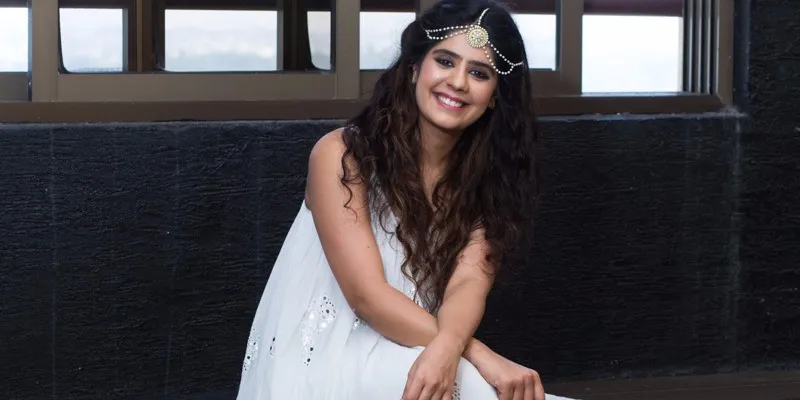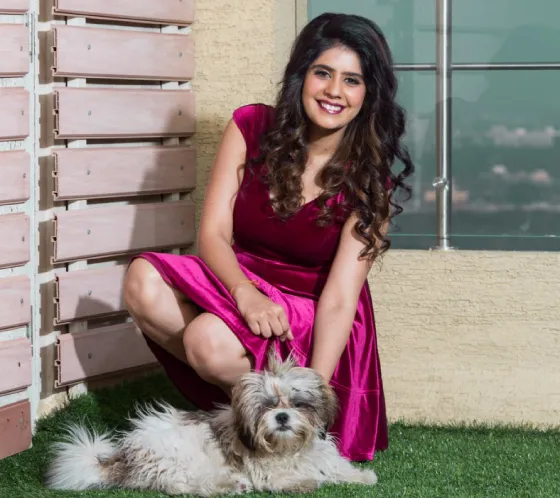If you are hoarding luxury goods, call DuaVivo’s Mehal Kejriwal to sell them for you
What do you do when you are young, other than observe the habits of your parents and realise your impulsive spending habit probably stems from watching them do the same for years.
This is exactly what happened with Mehal Kejriwal in the last five years. The 21-year-old was amazed at the perseverance her mother, Anju Kejriwal, exhibited in consistently buying luxury items. Buying over 100 bags, shoes, and several other luxury goodies, she would hardly use anything more than once. Several items from luxury labels like Louis Vuitton, Salvatore Ferragamo, and Versace were stowed away in the dark depths of her wardrobe, only to gather dust.

Mehal and her father, Vivek Kejriwal, would have a hearty laugh making fun of their mother's habit. But she wasn't the only one; Anju was guilty of hoarding luxury items herself.
One evening in early 2015 Mehal’s father told her that something must be done about the mini luxury goods store the women of the house has set up at home. Mehal thought about it the entire night and realised that if her mother had so many items that she would readily part with, certainly there were other people who would want to sell their pre-owned luxury items. “I told my dad that there could be a business here. I began talking to all my mother’s friends and the community around us about the usage of the items that they purchased and soon realised that people were hoarding luxury items,” says Mehal, founder of DuaVivo, which means 'second life' in Spanish. DuaVivo is an e-commerce and offline retail store that sells pre-owned curated luxury products. From the most expensive pens to shoes to clothing, you will find it on DuaVivo’s website and app.
The company was launched in September 2015 as a small website. While building the app, the website and registering the company Mehal realised that she had to do a market survey of the competition and the viability of the business. The research firm came back to her with information on seven other e-commerce companies selling curated luxury in India. Some of the names, of the competition thrown at her were Confidential Couture, Elitify, LuxPolis and Zapyle.
“I realised last year the people want to touch and feel the product too. So my strategy would not just be e-commerce, but also opening offline stores,” she says. Currently, DuaVivo has a store in Delhi and Bengaluru. But before she launched the e-commerce business Mehal also realised she needed to make the necessary changes in her life to run a business.
Only the beginning
Being in the final year of college, she had to make sure that she managed time between business and education. Mehal explains how she had to bring about a tectonic shift in her lifestyle in order to efficiently track everything in the company. For a quiet and unassuming person who listened to old Hindi cinema songs and country music she has transformed herself to making this business work. “I know people talk about failure. But I have no time to think about that because there is a market opportunity and there is a lot of work left to capture the market,” says Mehal.
Growing up in a business family she was always being groomed to think of ways to turn opportunities into business. But she also has her father’s backing; he has invested close to Rs 2.5 crore in the business. The plan, however, is to raise funds from outside as the company scales its offline retail operations.

The business model
By the end of 2015 and early 2016, Mehal began the process of sourcing pre-owned items. It started off with family and friends, then as the platform began operations a lot of content on social media sites led to people sending products to DuaVivo.
Mehal has a four-member sourcing team that buys luxury items from around the country. This team is crucial because it finds, essentially through social media, people and independent sellers, who are selling luxury items. Each item is scanned by an inspection team, which views all the pictures uploaded. This team comprises experts in luxury who can reject items based on authenticity by looking at photographs of the designs and the embossed brand marks on the product.
The stock is purchased on a consignment and buyout model. In a consignment model, the company can give back unsold inventory to the seller. In a buyout model, the company takes the risk of managing inventory that can yield good margins in the market. The company started with less than 100 stock keeping units; today DuaVivo stocks over 600 SKUs in its warehouse. The company believes the offline experience in Delhi and Bengaluru proved that people want to buy products. These luxury items start at Rs 25,000 and could go up to a couple of lakhs.
Today they sell close to 30 products a month through the app and the online, with an average selling price of Rs 25,000. The company hopes to sell more than 100 items a month to break even and believes that the offline strategy would help them exceed their targets. DuaVivo plans to open four more stores by the end of 2017.
“We started selling in luxury exhibitions to be noticed. It was in Mumbai that a lady looked at a really expensive bag and said she wants it. This was six months ago and after that, there was no turning back,” says Mehal.
According to EuroMonitor, Indian luxury retail was estimated to be $225 million in size. Since Mehal is selling pre-owned luxury it would be interesting to notice what segments of the high-income groups would buy their products. For Mehal’s 15-member team this has become a primary goal and she wants to focus on building processes that will make hers a million-dollar company by the end of the year.
“You need to be invested for a long term in retail and make conversions happen. Brand building is very important and an offline and online strategy is what every brand is getting into,” says Harminder Sahni, CEO of Wazir Advisors.

While Mehal finishes her final year in media studies at college, she certainly has to watch out for managing things like rentals, inventory and ensuring the quality of products. Having grown up around luxury goods, she knows her products and does not want to short change the first-time luxury buyer. This certainly is a second lease of life to pre-owned luxury products and Mehal has her mother to thank for the idea of stacking up on luxury items and making her a businesswoman.







